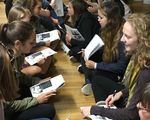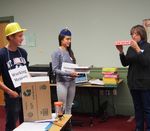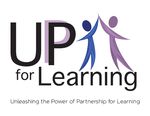MINDSET, METACOGNITION & MOTIVATION 2018/19 - UP for Learning
←
→
Page content transcription
If your browser does not render page correctly, please read the page content below
UP for Learning presents
MINDSET, METACOGNITION
& MOTIVATION 2018/19
What is the opportunity?
The M3: Mindset, Metacognition and Motivation initiative supports youth as
peer-to-peer messengers during advisories, sharing the latest research on:
• Mindsets: a critical examination of ingrained beliefs about ability, along
with the role of self-expectations and others’ expectations on academic
performance and life in general,
• Metacognition: learning about how we learn, and means to build and self-
monitor effective strategies, and
• Motivation: key variables that impact their level of learning engagement.
The team’s goal is to create a culture shift in their school that supports student
engagement and self-efficacy, builds intrinsic motivation, and fosters a growth
mindset for both educators and students.
Why does it matter?
Increased responsibility in a personalized learning model requires that students
gain fluency in the language of learning — mindset, metacognition and
motivation (Dweck, 2006; Mitra, 2001; Hattie, 2012). This fluency will ensure
The more students that all students are able to fully optimize personalized learning plans and
flexible pathways, and thrive in a proficiency-based model. It creates a bridge
know about how they between learners and teachers, fostering shared responsibility for learning and
learn and the more increased student ownership. Understanding how we learn enables each and
every individual to reach their greatest potential.
they believe in their
Research has shown that although all students benefit from mindset and
potential as learners, metacognitive skill development, those students challenged by poverty are
the more successful most positively impacted. M3 is a means to ensure equitable implementation of
they will be! When Vermont’s ambitious educational agenda.
students learn about
“As a school in search of resources to support our shift to a proficiency based
growth mindsets and
system, M3 was a welcome compliment. The lessons provide students and
effective metacognitive
teachers with useful and clear ways to build self-esteem, increase learning
strategies, they are potential and reinforce understanding for why we are transforming
empowered with critical instructional practices. Youth leaders as facilitators is a powerful way build
skills to ensure their student body interest and buy-in for the work.”
successful transition to —Phil Grant, principal, Peoples Academy
a more student-centered
learning model.Every mistake you make
is progress. What are the initiative components?
The M3 initiative begins with establishing an M3 team. The number of youth
members is double the number of advisories they will be co-facilitating. These
youth facilitator pairs will be partnering with the adult advisor in the advisory
they teach to prepare and deliver M3 sessions. At least two lead adults support
these youth facilitators as they:
1. Lead an hour-long faculty meeting to introduce the initiative
2. Collect an M3 pre- and post-survey from all advisory participants
3. L
ead approximately 10 advisory sessions utilizing the M3 curriculum
guide and powerpoints
“My greatest learning 4. Distribute faculty information sheets on creating a growth mindset
culture over the course of the initiative
from M3 was that student
5. Lead a culminating faculty meeting to reflect on the work and continue to
leadership is integral and shape a culture of growth mindsets, metacognition, and motivation
needed at the table.” Lead adult team members support youth facilitators throughout the process,
—teacher participant helping to organize the faculty meetings, touching base between sessions to
debrief the prior session and ensure preparation for the session ahead, and
troubleshoot any challenging situations that may arise. These adults are also
part of a concurrent professional learning community of educators from around
the state involved in the same initiative. They will explore brain-based teaching
strategies in greater depth and mobilize their colleagues to reinforce the M3
learning concepts, creating a shared language of learning.
Who participates?
Youth team members. Groups of up to 20 youth facilitators (serving 10
advisories) can be accommodated in this multi-school training. If the number
of advisories exceeds 10, a school-based training and support alternative is
possible.
Youth team members should share an interest in this content (e.g. as aspiring
teachers, psychology majors, or reflective learners), have a desire to develop their
“I was reminded of how teaching and facilitation skills, and be strong organizers. Students should come
much power we have as from 11th and 12th grades to facilitate in advisories for 9th and/or 10th grade
classes. Ideally this group is diverse and representative of the student body at
individuals to change our large.
own world and the world of
Lead adults. Lead adult partners enrolled in the M3: Mindset, Metacognition
others... for the better.” and Motivation course (see “What are the components of the graduate
—student participant course?” on next page) must be ready to support youth in this demanding task
on a weekly basis subsequent to the initial trainings. They will help with all
organizational aspects of the work, provide guidance and support to youth
facilitators and be peer leaders in establishing a common language of learning.
Advisory faculty. Adult advisors in the advisories being served will review the
M3 curriculum and relate it to their instructional practices. They will then
join the M3 youth facilitators and lead adults to participate in a two-hour co-
planning session to review roles and responsibilities and design the roll-out of
the initial sessions. They commit to meeting with the youth facilitator pair prior
to each advisory session, debrief each session, and develop and reinforce M3
concepts in their practices.Additionally, they will join the M3 youth facilitators and lead adults to
participate in a second partial-day training partway through the sessions
to be introduced to the remaining sessions and to co-plan and prepare for these.
One graduate credit through Southern New Hampshire University
or professional development hours toward recertification is available to honor
this commitment.
UP for Learning will provide:
• Two days of training for the M3 lead adults and youth facilitators to
provide core knowledge and skills in order to lead a faculty meeting and
“The learning experience implement the first six sessions.
for the M3 team over • A partial day of training for the M3 lead adults, youth facilitators, and adult
advisors in the advisories being served to review the remaining sessions.
the past several months
• An M3 Advisory Curriculum Guide, including a written overview of each
has been tremendously session, a PowerPoint to accompany each session, and access to all of the
empowering — both for materials referenced in the curriculum.
students and their peers as • On- and off-site coaching throughout the initiative.
well. Student leaders will What is the team’s commitment?
walk away from M3 with • Attend the two-day initial training sessions in central Vermont.
focused skills in leadership, • Host two partial-day trainings in preparation to begin the sessions and for
teaching, and making the final four sessions.
connections with multiple • Meet on a weekly basis at school to plan and implement all aspects of this
initiative, including regular check-ins with the facilitation teams to ensure
modes of learning.” their confidence and competence.
—BFA Fairfax blog • Plan and facilitate two faculty meetings.
• Assist the advisory faculty in reviewing the curriculum and understanding
their roles and responsibilities during the youth facilitated sessions.
• Implement and analyze a pre- and post-Mindsets and Metacognitive Skill
Sets survey to analyze the impact of the sessions and identify future areas of
focus for the faculty.
• Implement advisory sessions, of at least 30 minutes in duration, finishing
the curriculum by February vacation.
• Offer youth facilitators credit and/or evidence of proficiency in transferable
skills toward graduation. Learning targets linked to transferable skills are
available.
• Organize a closing session for youth facilitators to reflect on the experience
and plan steps moving forward.
• Communicate regularly with UP faculty and provide written
documentation as requested.
What are the components of the graduate course?
Lead adults enroll in a three-credit graduate course from Southern New
Hampshire University or receive professional development hours toward
recertification. This professional learning community experience includes
attending:
• A 4-hour dinner meeting prior to the first training day to review the
initiative.• A full-day conference with a brain-based learning expert.
• A 4-hour dinner meeting following the close of the advisory work to reflect
and celebrate.
• A closing session to reflect and celebrate.
We will also sustain a threaded discussion throughout the year by means
of Google classroom, reflecting on relevant readings and sharing field-based
experiences. See course syllabus for more details.
Meeting date summary:
Fall 2018
• M3 Graduate Class kick-off, September 6, 2018
• Initial trainings, September 19 and 27, 2018
• Two site-based partial-day trainings (dates TBD by each site)
Winter 2018/19
• Full day conference with Bill Rich, December 13, 2018 (adults)
“I am excited most about • Mid-year dinner meeting (adults)
the potential this work has Spring 2019
to transformatively change • Final M3 Graduate Class session when all teams have finished their
facilitation series (date to be identified later) (adults)
the culture at our school • Power2 Conference in May to present the team’s efforts (optional)
...this work helps change
our collective mindset. Who are the course leaders?
Assignments and activities Youth and adult alumni will co-create and help facilitate training opportunities,
in partnership with:
become opportunities not
Bruce G. Perlow, M.Ed., is Associate Director of UP for Learning and a social
obligations. Challenges studies teacher. He has helped to develop and implement UP for Learning
become embraced not curriculum and works with schools throughout the state to realize the potential
avoided. And mistakes of partnership in school redesign efforts. Prior to his work with UP for
Learning, he was a classroom teacher for 12 years.
become celebrated as
Helen Beattie, Ed.D, is Executive Director of Vermont’s Unleashing the Power
steps to growth not signs of Partnership for Learning (UP for Learning), which has received national
of failure. Achieving this recognition for innovative means to incorporate youth as partners in school
redesign efforts. Helen is trained as a school psychologist.
would do more to help our
students realize their full Cost
potential than any lesson A participating school’s cost of involvement in this initiative is $1,500.
or lecture could ever do.“ All lead adult partners (minimum of 2 per school) will be enrolled in either
-teacher participant the graduate course or the Professional Development hours option. Advisory
faculty have the option to pursue one graduate credit or Professional
Development hours.
This initiative is co-sponsored by the Vermont Department of Health and
participating schools are eligible for School Based Substance Abuse Services
(SBSAS) grant funding consideration.
For more information, contact Bruce G. Perlow at
bruce@upforlearning.orgYou can also read



























































